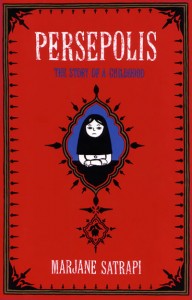‘I believe that the entire nation should not be judged by the wrongdoings of a few extremists ‘
This week our class was discussing Marjane Satrapi’s autobiographical graphic memoir ‘Persepolis’. In this book Satrapi is sharing her experience of growing up during the fundamentalist revolution and Arabic invasion in Iraq in 1980-ies. In the introduction to the memoir Satrpi claims that people don’t have a moral right to draw conclusions about a nation relying solely on mistakes of a few members of their society. The author stands firm in defending her country through the whole story, even though she doesn’t deny the hard political situation it is facing. This way of telling country’s history is informal and it doesn’t include all the important facts and chronologies. However, it provides a reader with another perspective, giving them opportunity to understand what it feels like to be a child in the place, where joy is sinful and people are deprived of freedom.
To what extend should political news affect the way one looks at a nation? Everyday news about wars and conflicts spread all over the world. Consciously or not people tend to make assumptions and shape a particular attitude towards the subject even without sufficient evidence. Unfortunately, hasty generalizations is a common phenomenon nowadays. When people hear about Iran Islamic revolution in 1979 they usually think about extremists and put this tag on the whole nation. Data presented by media is usually accessible. Numbers of victims shown on TV don’t include their names, backgrounds, families or any kind of personal information. Thus it is very easy to get used to the idea of war and become judgemental of the whole population of a country, or a particular group of people, who share the same culture or religion.
So, how can one representative of a nation change the way majorities look at their country? Satrapi is one of those people who decided to take a stand and show the rest of the world that ‘Iranians were not an abstract concept but rather human beings for whom the words pride, dignity, patriotism and life mean exactly the same thing as they do to Americans’. ‘Persepolis’ awakens reader’s empathy and awareness of the reality Iranians live in. It changes people’s attitude to the nation as a whole by broadening their horizons and getting rid of stereotypes they keep in their heads.
Works cited:
- Satrapi, Marjane, and Marjane Satrapi. 2007. The complete Persepolis. New York: Pantheon Books.
- Satrapi, Marjane. ‘Defending My Own Country’. The New York Times 28 November 2005
